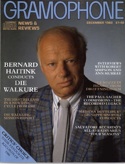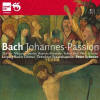Texte paru dans: / Appeared in:
*

GRAMOPHONE (12/1988)
Pour s'abonner /
Subscription information
Newton Classics
8802052

Code-barres / Barcode:
8718247710522
Reviewer:
L.S.
With eight CD versions of the St John Passion currently available, record buyers have plenty of opportunity to follow their own preferences over performance style : 'authentic', with period instruments and small forces, or 'orthodox'; all-male or mixed·voice choruses; different singers for the character parts and the arias, or soloists doubling the two . So, first of all, let's be clear that this is a performance with modern instruments, a mixed choir (a good one) and a posse of singers, each separately cast except Peter Schreier, who not only takes the role of the Evangelist as well as singing the tenor arias, as he did in the RilIing recording (CBS CD M2K39694-not submitted for review) , but also conducts the whole performance. Quite a workload, and quite an achievement: only someone with his stamina and superb technical control could bring it off.
His reading stands at the opposite extreme from that of Harnoncourt (Teldec/ASV CD 8 35018, 9/ 87), whose long gaps between numbers and general air of austerity seemed to shun the drama· tic as verging on the vulgar: Schreier goes all out for dramatic intensity and continuity; and his Evangelist, far from standing outside the action as an objective narrator, is caught up in the diverse emotions of the story (pacing his recitatives with great flexibility) . He has a mannerism, which not all will accept, of hardening his tone in the final bars of recitatives as if to galvanize into action the chorus which follows him. There is urgency in his "Ach, mein Sinn" (though, as one brought up on the Patzak recording, I prefer it taken less fast than this), and he copes triumphantly with that dreaded long aria (to rather distasteful words) "Erwage".
His casting is a little odd. Robert HolI, singing with fine vitality (though perhaps too robustly for Christ 's last words), is unusual in presenting not a gentle Jesus meek and mild but a stalwart of the Church militant: the trenchancy or his first words comes as a shock. Andreas Scheibner is a somewhat colourless Pontius Pilate; Olaf Bar produces gentle , soothing tone in "Betrachte, meine Seele " and spins a smooth line in "Mein teurer Heiland " (with the chorale sung very softly in the background), but the bottom notes in "Eilt, eilt" barely lie within his range; Marjana Lipovsek comes into her own only in the vigorous middle section or " Es ist vollbracht", elsewhere sounding rather small of voice, especially in her first aria , where the two oboes are much louder than her; and Roberta Alexander was a curious choicefresh-toned but very girlish, and in "Ich folge dir" not ideally secure on her top Gs and A flats (and what is the authority for her throbbing semiquaver ornamentation in bars 80 and 81 of "Zerfliesse, mein Herze"?). The chorales are flowingly and sensitively sung, the choruses very secure though mostly very fast and, in the personification of the mob, vividly howling for bloodlust. The attractively light, fast treatment of the chorus about dividing Jesus 's cloak, and the excited flurry of the flutes as the Jews protest that it is not lawful for them to put a man to death, in some measure compensate for Schreier's eccentric handling of the opening chorus, with a great bump of an accent on each and every half-bar and harshly aggressive barks of "Herr!". The instrumental contributions throughout are admirable, but I suspect th a t on repeated hearings I would prefer the organist to have kept to unembellished cadences in the recitatives, and in her continuo to have twinkled a little less in the two-foot register.
A bonus of major interest is provided in three arias which Bach included in his 1725 revision (a year after the first perfo rmance). There is a fine dramatic a ria for baritone against a chorale for the sopranos, an extremely interesting tenor aria with agitated strings which temporarily replaced " Ach , mein Sinn", and, instead of " Erwage", an almost equally long and elaborate aria for tenor with an obbligato for two oboes. Bach must surely have felt some compunction in finally deciding to withdraw them again and revert to his original plan.
Cliquez l'un ou l'autre
bouton pour découvrir bien d'autres critiques de CD
Click either button for many other reviews


